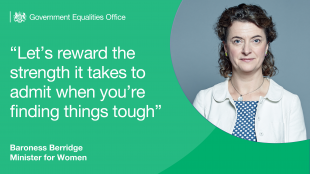
International Men’s Day is celebrated across the world and recognises the positive value men bring to the world, their families and communities. Here in the UK the core themes this year are:
- making a positive difference to the wellbeing and lives of men and boys
- raising awareness to support men’s and boys’ wellbeing
- promoting a positive conversation about men, manhood and masculinity
This International Men’s Day, Baroness Berridge, the Minister for Women and Parliamentary Minister for the School System, shares her thoughts on the importance of early education around mental health and wellbeing.

Stigma and stereotypes
In England, around 1 in 8 men have a common mental health problem. Men are also three times more likely to die by suicide than women, and it is the most common cause of death for men aged 20–49 in the UK.
We want to address this issue and do what we can to prevent it, that is why I’m proud that this government has published the first ever Suicide Prevention Workplan. And, as we mark International Men’s Day today, it is important to reflect on how we can continue to open up a conversation on the impact that poor mental health can have.
Whilst many of the same wellbeing challenges are experienced by both boys and girls, some difficulties and influences on mental health may be especially relevant for boys, such as pressures to do with masculinity. However, young men may be reluctant to seek support for their mental health or disclose mental health problems to friends and family because of stereotypes or stigma about how men should behave.
Stereotypes can also affect mental and physical health and can lead to violent or self destructive behaviour. Two thirds of 18–24 year old men believe they are pressured to display hyper-masculine behaviour, which can have a real impact on the wellbeing of them and those around them.
We need to challenge these stereotypes, making clear that anyone can pursue and achieve their goals and that this government will help them do that by creating equality of opportunity.
Young people, mental health and wellbeing in schools
The breaking down of stigma around asking for help with emotions should also start early in schools. School is where friendships begin, where young people discover their ambitions and where  they hone their sense of self-worth.
they hone their sense of self-worth.
The Department for Education (DFE) is making sure that schools are placing an important focus on wellbeing and mental health.
In June of this year, DFE published new training to support teachers in teaching about mental wellbeing in Primary and Secondary schools. This training contains key resources for ensuring that pupils have the knowledge and capability to take care of themselves and receive support if problems arise.
The module outlines how pupils should be taught to recognise and talk about their emotions, including having a varied vocabulary of words to use when talking about their own and others’ feelings. They’ll also be told where and how to seek support, including whom in school they should speak to if they are worried about their own or someone else’s mental wellbeing or ability to control their emotions.
Though not specifically designed in response to the COVID-19 pandemic, this training may help staff leading work in schools to manage the impact of the outbreak on pupil wellbeing and mental health, and will provide useful tools for young people coping with the extra challenges posed by lockdown.
Vulnerability as strength
This training will support the brilliant work schools already do to foster pupil wellbeing and develop the resilience and character that we know are fundamental to pupils being happy, successful and productive members of society.
Teachers and school staff will tell you from experience that young men are just as capable of talking about their emotions as girls when they are given the space and the tools to do so.
So, this International Men’s Day, let’s do what we can to normalise asking for help whoever you are and let’s reward the strength it takes to admit when you’re finding things tough.

Resources
Knowing how to support mental wellbeing can help young people feel better and have better relationships with the people around them. Take a look at Every Mind Matters for tips and advice on staying mental healthy.
If you or someone you know is experiencing a mental health crisis, or is at risk of committing suicide, it's important to get help quickly.
Call one of the national mental health charities for advice and support:
- Samaritans provide a helpline that is open 24 hours a day, seven days a week – call 116 123 or email jo@samaritans.org.uk
- Mind - a national mental health charity, operate a helpline from 4.30pm to 10.30pm, Monday to Friday, that can be used in a crisis – call 0300 304 7000 or text 86463
- Campaign Against Living Miserably (CALM) - a national charity offering support to men in the UK, of any age, who are down or in crisis via their website, web chat or helpline, which is open 365 days a year, 5pm to midnight

Recent Comments